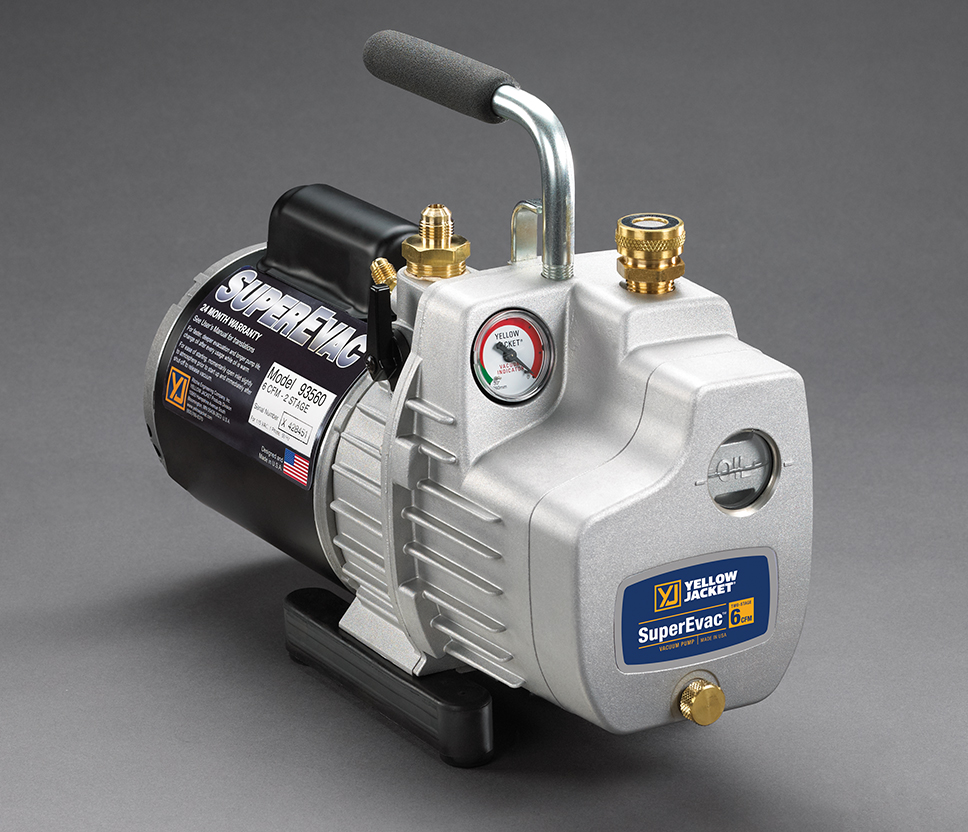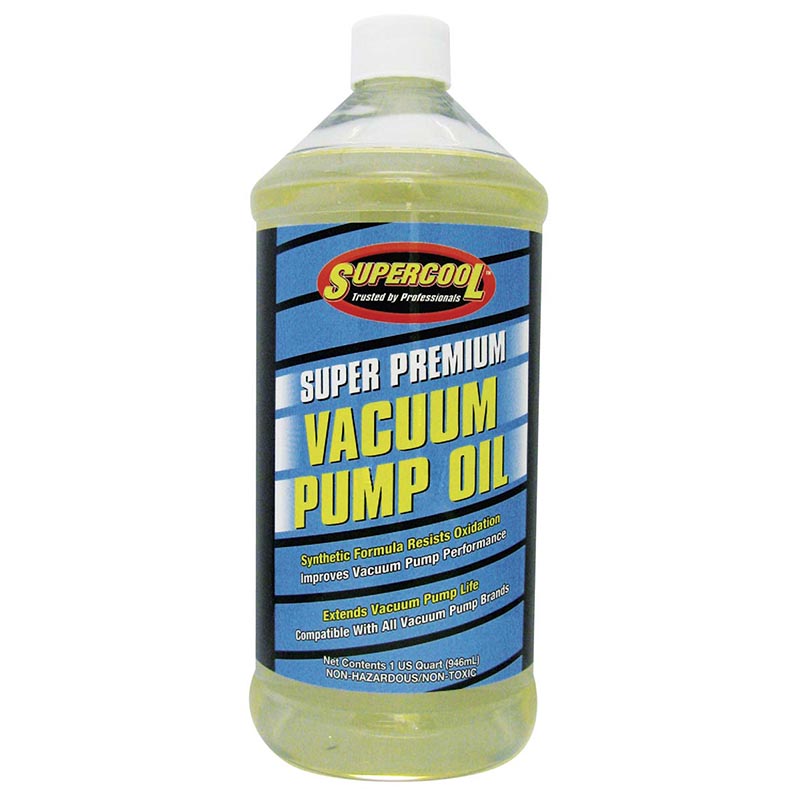As an Amazon Associate, I earn from qualifying purchases
A/C vacuum pump oil is essential for maintaining your pump’s efficiency and longevity. It lubricates the moving parts, ensuring smooth operation.
Maintaining the performance of your air conditioning vacuum pump hinges on using the right oil. This specialized lubricant is designed to withstand the rigors of removing moisture and contaminants during the evacuation process. Selecting high-quality vacuum pump oil can prevent wear and tear, minimize maintenance costs, and extend the lifespan of your pump.
As you prepare your HVAC system for peak operation, remember that the oil you choose plays a pivotal role in the system’s overall health. Ensuring you opt for a non-detergent, hydroprocessed oil will contribute significantly to the vacuum pump’s performance, preventing the formation of sludge and varnish that can impede its functionality. Keep in mind that regular oil changes are crucial for optimal performance and that the specific type of oil may vary depending on the pump model you are using.

Credit: yellowjacket.com
Essentials Of A/c Vacuum Pump Oil
Understanding the importance of A/C vacuum pump oil is key to maintaining your system. This oil ensures your pump operates at peak performance. It also provides the necessary lubrication to prevent wear and tear. Choosing the right oil can extend the life of your vacuum pump.
Role In Vacuum Pump Efficiency
A/C vacuum pump oil plays a crucial role in system efficiency. It seals and lubricates the pump. This action reduces friction. Less friction means better performance. The right oil can also help in achieving a proper vacuum. This is essential for removing moisture and air from A/C systems.
Compatibility With Different Pump Types
Different pumps need specific types of oil. This ensures optimal performance. Compatibility is key. The oil must match the pump’s design and materials. Use the manufacturer’s guide to find the right oil. This will prevent damage and ensure smooth operation.
| Pump Type | Recommended Oil Type |
|---|---|
| Rotary Vane | Mineral Oil |
| Diaphragm | Synthetic Oil |
- Check compatibility before buying.
- Follow the manual for the best results.
- Use the right oil to avoid pump failure.
Types Of Vacuum Pump Oil
Understanding the types of vacuum pump oil is key to ensuring peak performance of your A/C vacuum pump. Different oils are designed for specific applications and pump types. Let’s explore the options available to keep your vacuum pump running smoothly.
Mineral-based Oils
Mineral-based oils are common and widely used in vacuum pumps. Extracted from natural resources, these oils offer good lubrication at a cost-effective price. They work well for general use but may not be ideal for high-temperature or chemical applications.
- Cost-effective
- Good lubrication properties
- Not suited for extreme conditions
Synthetic Oils
Synthetic oils are engineered for superior performance. They can handle higher temperatures and resist breakdown better than mineral oils. This makes them perfect for heavy-duty and specialized applications.
- High-temperature resistance
- Long-lasting performance
- Ideal for specialized equipment
Hybrid Variants
Hybrid variants combine the best features of mineral and synthetic oils. They provide excellent lubrication while being more resistant to harsh conditions than standard mineral oils. These hybrids are a great middle-ground solution.
| Type | Benefits | Best Used For |
|---|---|---|
| Mineral-Based | Affordable, effective lubrication | General use |
| Synthetic | High-temperature stability, durability | Heavy-duty applications |
| Hybrid | Balanced performance, versatility | Versatile environments |
Changing The Oil
Maintaining your A C vacuum pump ensures its longevity and efficiency. One crucial aspect is changing the oil. Regular oil changes keep your pump running smoothly.
Signs It’s Time For A Change
Knowing when to change the oil in your vacuum pump is key. Look for these signs:
- Discoloration of the oil – Oil that turns dark or cloudy.
- Decreased performance – The pump struggles to maintain a vacuum.
- Strange noises – Clicks or grinding sounds from the pump.
- Visible particles – Small bits floating in the oil.
Step-by-step Oil Change Process
Changing the oil in your A C vacuum pump is simple. Follow these steps:
- Turn off the pump and let it cool.
- Remove the oil cap and drain the old oil into a container.
- Clean the oil reservoir using a clean rag.
- Refill with fresh oil specifically designed for vacuum pumps.
- Replace the oil cap and restart the pump to check for leaks.
Regular oil changes enhance your pump’s performance and durability. Use the right oil and follow these steps to ensure optimal operation.
Performance Factors
When choosing the right A/C vacuum pump oil, several key performance factors come into play. These factors ensure the pump operates at peak efficiency. They protect its internal components. Let’s dive into the specifics that can make or break the performance of your A/C vacuum pump oil.
Viscosity And Its Impact
Viscosity refers to the thickness of the oil. It affects how the oil flows through the vacuum pump. Different vacuum pumps need different oil viscosities. The right viscosity ensures a tight seal and proper lubrication. It also impacts the pump’s ability to reach a full vacuum. Here’s what you need to know:
- Thick oils are great for high temperatures.
- Thin oils work better in colder environments.
Thermal Stability
Thermal stability is the oil’s ability to resist breakdown at high temperatures. A stable oil maintains its performance even when it gets hot. This is critical for the vacuum pump’s operation. Here are the benefits of thermally stable oils:
- Less breakdown means fewer deposits.
- Deposits can clog the pump and reduce efficiency.
- Stable oil extends the pump’s life.
Oil Lifespan
The lifespan of A/C vacuum pump oil depends on its quality and operating conditions. High-quality oils can last longer. They reduce the need for frequent changes. Here’s what affects oil lifespan:
| Factor | Impact on Oil Lifespan |
|---|---|
| Contamination | Shortens lifespan |
| Moisture | Leads to oil degradation |
| Usage frequency | Affects change intervals |
Regular oil changes and choosing the right oil extend your pump’s life. They keep it running smoothly.
Troubleshooting Common Oil Issues
Troubleshooting oil issues in an A/C vacuum pump is crucial for performance. The oil in the pump ensures smooth operation. Over time, it may face problems. Knowing what to look for can save time and money. Let’s explore common oil issues and how to fix them.
Contamination Signs
Oil contamination can cause serious pump issues. Look for these signs:
- Discoloration: Oil should be clear. Dark oil means it’s time to change.
- Debris: Visible particles in the oil are a clear contamination sign.
- Odor: A burnt smell indicates overheating and oil breakdown.
Change the oil if you spot these signs. Always use the recommended oil type.
Foaming Causes And Solutions
Foam in the oil can reduce a pump’s efficiency. Causes include:
| Cause | Solution |
|---|---|
| Moisture | Drain the oil. Refill with fresh oil. |
| Wrong Oil Type | Switch to oil designed for vacuum pumps. |
| Overfilled Oil | Reduce oil to the correct level. |
Address foaming promptly to maintain pump performance. Check the oil level and quality regularly.

Credit: supercool.ac
Best Practices For Maintenance
Proper maintenance of an A/C vacuum pump ensures longevity and performance. Regular check-ups and oil quality control are crucial. Follow these simple steps for optimal pump operation.
Regular Maintenance Schedule
Set up a consistent maintenance routine to prevent unexpected breakdowns. Regular service keeps your pump in top shape.
- Check the pump’s operation weekly.
- Clean any debris from the pump monthly.
- Inspect for wear and replace parts as needed.
Ensuring Optimal Oil Quality
The oil in your A/C vacuum pump needs regular attention. It is the lifeblood of the system.
| Oil Check Frequency | Action Required |
|---|---|
| Before each use | Inspect oil color and level |
| Every 10 hours of use | Replace with fresh oil |
| After extensive use | Perform a deep clean |
Use high-quality oil designed for vacuum pumps to ensure peak efficiency.
- Choose the correct oil for your specific pump model.
- Check for contaminants or discoloration regularly.
- Drain and refill oil to maintain purity.
Remember, clean and fresh oil equals a smooth-running pump.

Credit: store.acpro.com
Frequently Asked Questions
What Kind Of Oil For Ac Vacuum Pump?
Use a high-quality vacuum pump oil designed specifically for AC vacuum pumps. Avoid using generic or motor oils, as they can cause damage and reduce efficiency.
Is Vacuum Pump Oil The Same As Air Compressor Oil?
No, vacuum pump oil and air compressor oil are not the same; each is formulated for its specific type of machinery.
Can I Use Motor Oil In A Vacuum Pump?
Using motor oil in a vacuum pump is not recommended. Vacuum pumps require specific oils designed for high vacuum pressure and thermal stability. Always use the correct vacuum pump oil.
Can You Use Compressor Oil In A Ac Vacuum Pump?
No, you should not use compressor oil in an AC vacuum pump. AC vacuum pumps require specific oil types designed for optimal performance and longevity. Using compressor oil can damage the pump and void warranties. Always check the manufacturer’s recommendations.
Conclusion
Selecting the right A/C vacuum pump oil is critical for your system’s performance and longevity. Ensure you choose a high-quality oil that matches your pump’s specifications for optimal functionality. Regular maintenance, including timely oil changes, will keep your A/C system running smoothly.
Stay cool and efficient with the perfect vacuum pump oil choice!
As an Amazon Associate, I earn from qualifying purchases
